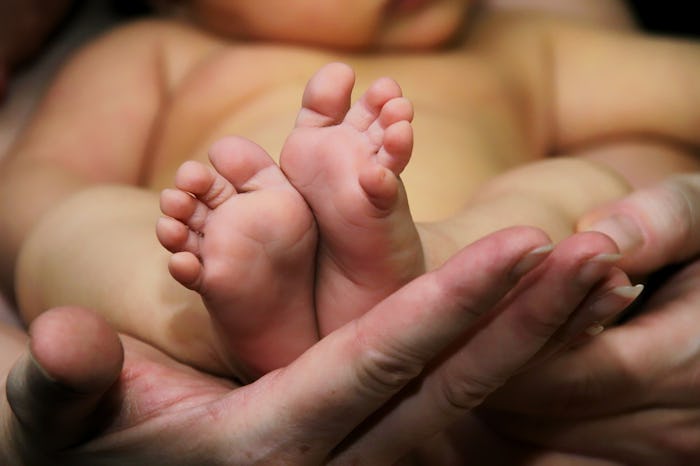Life
Maternal Obesity May Lead To Larger Babies & It's More Dangerous Than It Seems
Obesity — having a body mass index of 30 or above, according to the most recent national statistics — is considered one of the most dangerous preventable health conditions in the United States. And when it comes to pregnancy, medical professionals have long warned women about the additional risks that the condition can pose to maternal health, including gestational diabetes, high blood pressure, preterm birth, and even miscarriage. But a new study published this week is shedding light on the direct impact that an expecting mother's excess body weight can have on fetal health. According to new research from the National Institutes of Health, obesity during pregnancy can lead to larger babies — and the implications are far more serious than one might imagine.
Researchers took ultrasound scans of nearly 2,800 pregnant patients — 443 obese women and 2,300 non-obese women — for the study, according to a summary posted on the NIH website. The team considered women with a BMI anywhere between 30 to 44.9 as obese, while those with a BMI of 29.9 or below were considered non-obese. Beginning in the 21st week of pregnancy, the team examined the thigh and upper arm bone lengths of fetuses from women in both groups.
According to the study, published this week in JAMA Pediatrics, by the 38th week of pregnancy, babies born to obese moms were more likely to have longer thigh (.03 inches) and upper arm (.04 inches) bones compared to babies born to non-obese women. Babies whose mothers were considered obese were also more likely to have a birth weight beyond the 90th percentile, according to the findings.
Why is that considered serious? For starters, delivering a larger infant can lead to serious — and even life-threatening — complications, according to the Mayo Clinic. There’s an increased chance that the infant could suffer a bone fracture or need assistance (via forceps or vacuum) during delivery. And according to the Mayo Clinic, delivering a larger baby also increases the odds for vaginal laceration, C-section, and possible uterine rupture.
What’s more, none of the women in the study who were classified as obese had any other obesity-related health condition. That suggests maternal obesity alone (that is, not complicated by any other related health condition, like diabetes or heart disease) was enough to cause babies to develop macrosomia, or large body size at birth, according to the report.
Dr. Cuilin Zhang, a researcher in the Division of Intramural Population Health Research at NIH’s Eunice Kennedy Shriver National Institute of Child Health and Human Development, who co-authored the study, wrote in a blog post on the NIH website that the findings suggest a need for better monitoring in a greater number of cases than once assumed.
Our results underscore the importance of attaining a healthy body weight before pregnancy. They also suggest that clinicians should carefully monitor the pregnancies of all obese women, regardless of whether or not they have obesity-related health conditions.
At a time when as many as one in three American women can be considered obese, according to the Centers for Disease Control and Prevention, the findings have serious implications for women’s health. The heavier a woman is at the start of her pregnancy, the greater her risk of developing a host of medical conditions that can have a direct impact on her pregnancy, according to the March of Dimes. And because obesity hits some groups of women harder than others — especially along income and education lines, according to the CDC — that could mean that a smaller number of infants could bear a disproportionate risk for poor health outcomes as a result.
The recent findings add to a growing body of research on the long-term effects that obesity in pregnancy has on newborns. Earlier studies have found that maternal obesity is connected to a higher risk of developing certain birth defects like spina bifida, cleft lip, and hydrocephalus. And a study published earlier this year linked maternal obesity in early pregnancy to a greater risk of epilepsy later in life.
But, far more research must be done on exactly why obesity and fetal growth are so closely linked, according to the study's summary. And while this recent study underscores the significant risks that obesity brings in pregnancy, there are ways to reduce the risk of pregnancy complications due to obesity, according to the March of Dimes website. Getting regular prenatal care, staying active, and eating a balanced diet can go along way to ensuring better health for mothers and babies. And so, the biggest takeaway from this study — and thousands of others — may be the importance of getting adequate prenatal care throughout every pregnancy.
Check out Romper's new video series, Romper's Doula Diaries:
Watch full episodes of Romper's Doula Diaries on Facebook Watch.
